#African-Saharan ethnic groups
Text
Chinguetti: A Medieval Trading Center on the Edge of the Desert
Chinguetti, a captivating medieval trading center nestled on the Adrar Plateau in northern Mauritania, holds a rich history that dates back to the 13th century. This remarkable city, also known as a ksar, served as the hub for a network of trans-Saharan trade routes, playing a pivotal role in facilitating trade and cultural exchange in the region. Even today, Chinguetti continues to draw a modest…
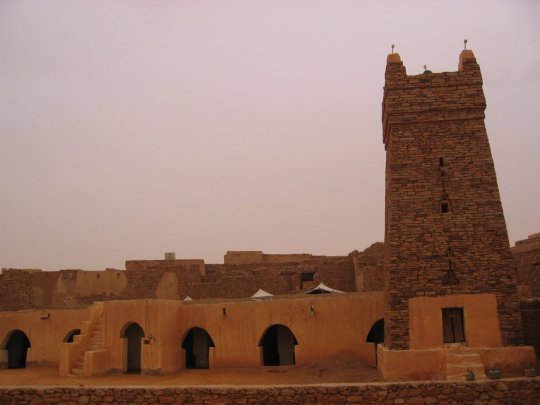
View On WordPress
#African History#African-Saharan ethnic groups#Amazigh history#Azayr#Berber history#Chinguetti#North African History#Soninke history#West African history
1 note
·
View note
Text
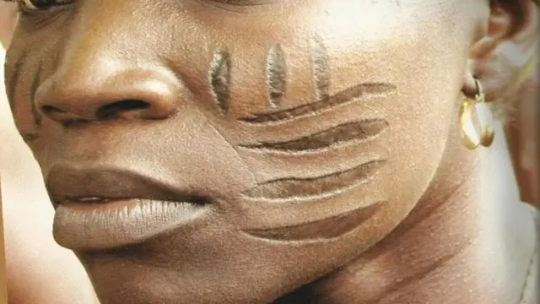
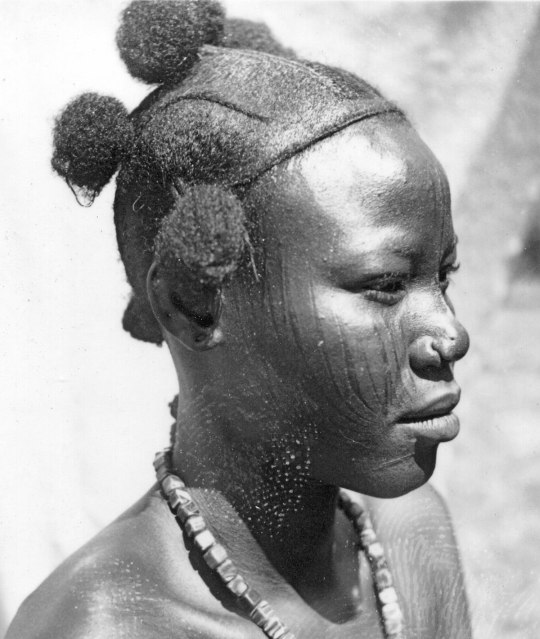
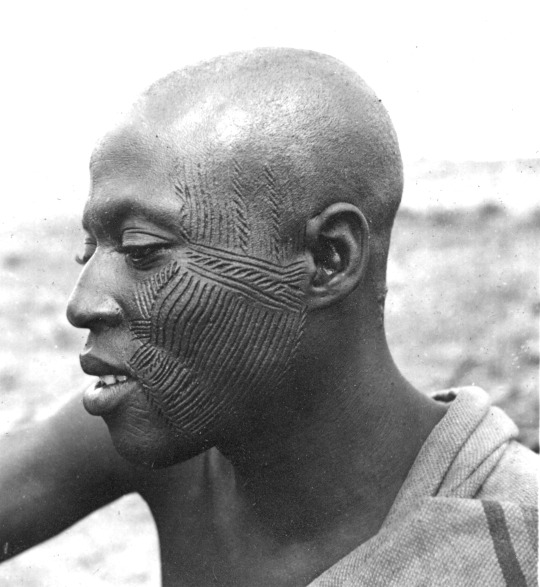
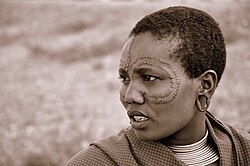
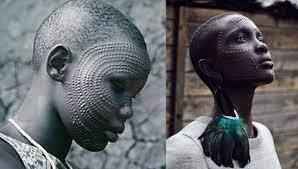
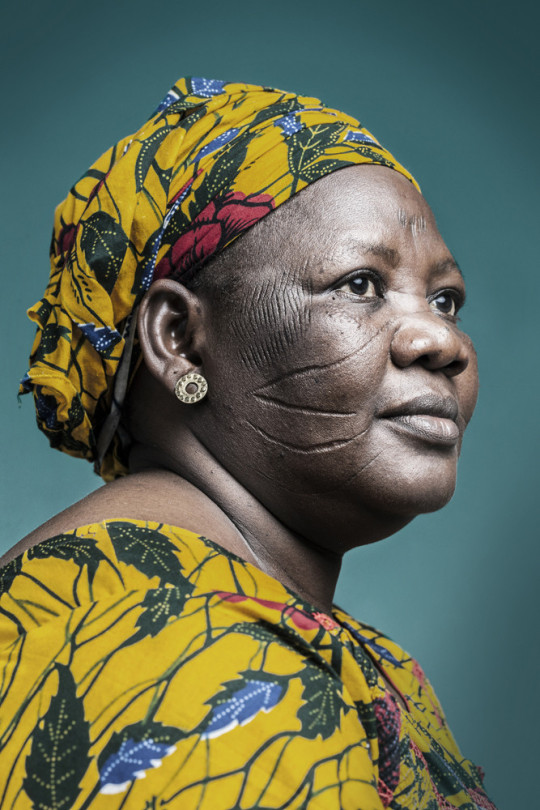
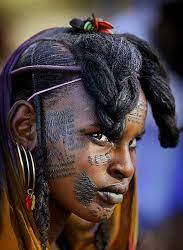

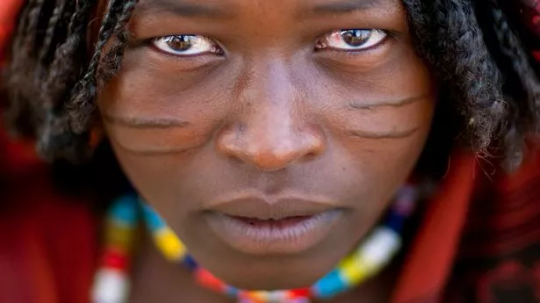
In Africa, European colonial governments and European Christian missionaries criminalized and stigmatized the cultural practices of tattooing and scarification; consequently, the practices underwent decline, ended, or continued to be performed as acts of resistance.
Among the ethnic groups in sub-Saharan Africa that traditionally practice scarification are the Gonja, Dagomba, Frafra, Mamprusi, Nanumba, Bali, Tɔfin, Bobo, Montol, Kofyar, Yoruba, and Tiv people of West Africa, and the Dinka, Nuer, Surma, Shilluk, Toposa, Moru, Bondei, Shambaa, Barabaig, and Maasai people of East Africa.
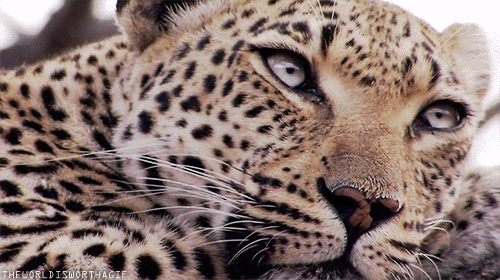
Traditionally, the most common reason for scarification has been as a rite of passage.
Scarification has been widely used by many West African tribes to mark milestone stages in both men and women's lives, such as puberty and marriage.
In many tribes, members unwilling to participate in scarification were generally not included in the group's activities, and are often shunned from their society.
According to anthropologist Grace Harris, group members lacking the normal characteristics consistent with the group are not considered as having acquired the full standing as agents in their society; they would also lack the capacity for meaningful behavior, such as greeting, commanding, and stating.
Therefore, scarification can transform partial tribe members into "normal" members entirely accepted by the group.
Scarification is a form of language not readily expressed, except through extensive and intricate greetings, and gives the ability to communicate fully, which is a key element for being considered as a normal member of the group.

One reason why scarification is used as confirmation of adulthood is how it shows the ability to endure pain. With young men, the endurance of the pain of scarring exhibits strength and discipline, especially in tribes where males have roles as hunters and warriors.
A young man who has already experienced the feeling of torn or cut flesh is considered less likely to fear the teeth of a wild animal or the tip of an enemy's spear.
In Ethiopia and Zambia, elaborate scarification is often done on women at puberty, used to denote a willingness to be a mother. The markings show that she can stand the pain of childbirth, as well as being an indication of her emotional maturity.
Some of these rites of passage have spiritual or religious roots, such young boys in the Chambri tribe of Papua New Guinea undergo scarification resembling crocodile scales to mark their transition into manhood, a ritual which stems from the belief that humans evolved from crocodiles.
In Ethiopia, Suri men scar their bodies to show that they have killed someone from an enemy tribe;
the Mursi practice scarification for largely aesthetic reasons in order to attract the opposite sex and enhance the tactile experience of sex.
The Ekoi of Nigeria believe that the scars serve, on their way to the afterlife, as money.
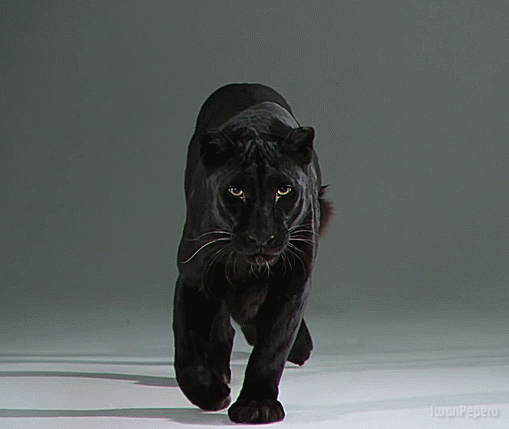
#ekoi#mursi#maasi#nigerian#scarification#african#afrakan#kemetic dreams#brownskin#brown skin#afrakans#africans#african culture#afrakan spirituality#suri#ethiopian#zambia#afterlife#sacrifice#free will#immortality#philosophy#chambri#rite of passage#tiv#Gonjas#Nanumbas#Dagombas#Frafras#ghana
189 notes
·
View notes
Text

AFRICA, a continent rich in history and culture, was a diverse and vibrant place 100 years before the colonial era began. The period prior to European colonization of Africa was characterized by the existence of powerful and sophisticated civilizations, trade networks, and diverse societies. During this time, Africa was home to thriving kingdoms and empires, such as the Kingdom of Ghana, the Mali Empire, the Benin Empire,and the Great Zimbabwe Empire.
One of the remarkable aspects of Africa before colonialism was the economic prosperity and trade networks that existed across the continent. The Trans-Saharan trade routes connected the North African coast with the interior of the continent, facilitating the exchange of goods, ideas, and cultures. The trade in gold, salt, ivory, and other resources contributed to the wealth of African societies and enabled the development of urban centers and marketplaces.
In addition to trade, agriculture played a significant role in the pre-colonial African societies. Many regions practiced advanced farming techniques, growing crops such as grains, yams, and millet. Livestock farming was also a common practice, with cattle, sheep, and goats being raised for food, milk, and trade. The agricultural surplus generated by these practices supported the growth of populations and the development of complex societies.
Socially and culturally, pre-colonial Africa was characterized by a rich tapestry of traditions, languages, and belief systems. The continent was home to a diverse array of ethnic groups, each with its own customs, art forms, and social structures. Oral traditions, storytelling, and music played a vital role in communicating histories and values within African societies. Religious practices were also diverse, ranging from indigenous animist beliefs to Islam and Christianity, which were introduced through trade and migration.
The political landscape of Africa before colonialism was marked by the presence of powerful kingdoms and empires that governed vast territories. These political entities were often organized hierarchically, with rulers holding significant authority over their subjects. The Kingdom of Ghana, for example, controlled trade routes and amassed wealth through taxation and tribute. The Mali Empire under Mansa Musa was renowned for its wealth, power, and intellectual pursuits.
In conclusion, Africa 100 years before colonialism was a continent teeming with cultural diversity, economic prosperity, and political sophistication. The continent's vibrant civilizations and societies thrived through trade, agriculture, and social structures that sustained their way of life. The legacy of pre-colonial Africa continues to influence the continent's present-day cultures, identities, and aspirations, reminding us of the resilience and vitality of Africa's past.
📸 A lady from today Ghana 🇬🇭 adorned in gold jewelry #africa
45 notes
·
View notes
Text
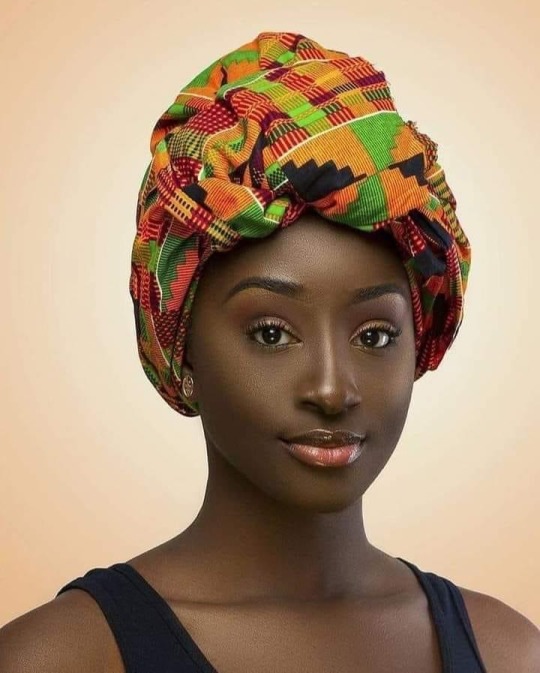
Interesting facts about Sierra Leone
1. Sierra Leone 🇸🇱 is located in West Africa on the Atlantic coast and bordered by Guinea and Liberia.
2. The country takes its name from the Portuguese explorer Pedro de Sintra who named the country “Serra Leoa” (Lion Mountains) due to the impressive mountains he saw while sailing along the West African coast in 1462.
3. Archaeological evidence suggests Sierra Leone 🇸🇱 has been inhabited for thousands of years with successive waves of inv.aders as well as immigration from inland peoples making up today’s diverse population
4. Sierra Leone 🇸🇱 is home to 16 ethnic groups. Each group has their own language and traditional attire.
5. If there is one thing that this small nation is blessed with is its rich mineral resource. Sierra Leone 🇸🇱 is famous for its diamonds. Apart from diamonds, bauxite and titanium are also extracted on large scale. It also produces gold and rutile on a large scale.
6. Sierra Leone’s capital city, Freetown, was founded as a home for repatriated and rescued former slaves in 1787
7. English is the official language; however, Krio is the language that is understood by most of the population. Krio is a Creole language, first spoken by descendants of freed Jamaican slaves who settled in the Freetown area.
8. Sierra Leone 🇸🇱 has a simple horizontally striped green, white and blue flag. Green stands for agriculture and the mountains, white for unity and justice, and blue for the aspiration to “contribute to world peace, especially through the use of its unique natural harbour at Freetown”.
9. The Outamba-Kilimi National Park, a tract of savannah and jungle in Sierra Leone, is home to highly diverse wildlife including primates such as chimpanzees, colobus monkeys and sooty mangabeys as well as hippos, bongo antelopes, buffalo, forest elephants and over 150 species of bird.
10. Freetown was home to the first institution of higher learning in modern sub-Saharan Africa after the collapse of the university at Timbuktu. Fourah Bay College opened in 1827 and at the time was the only alternative to Europe and America for British colony West Africans who wanted a university degree.
11. Sierra Leone’s “blood diamonds” helped fuel atr0cities during the w.ar. Blood diamonds, also known as conflict diamonds, were used to fund certain conflicts in Africa
12. Freetown has the largest natural harbour on the African continent. It is capable of receiving oceangoing vessels of all kinds.
Guys let's get our YouTube channel (YT: Historical Africa) to 200k subscribers. Kindly Click on the link to subscribe https://youtube.com/c/HistoricalAfrica
30 notes
·
View notes
Text
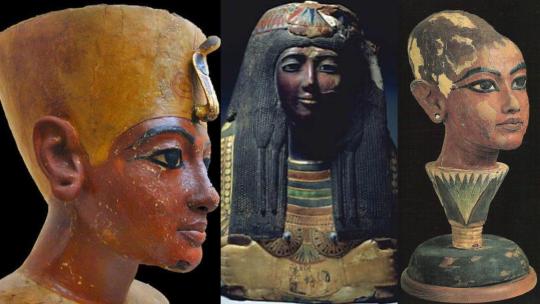
Ancient Black Egyptians? They were African? Were they? This was a topic that was raised and discussed. It is true that other studies have been carried out which suggest the opposite. But the answer is there if you look closely at the enormous array.
Here are the facts that prove ancient Egyptians were Black and Africans.
Ancient Egyptians referred to their homeland as Kmt (conventionally pronounced as Kemet). According to Diop, the Egyptians referred to themselves as “Black” people or kmt, and km was the etymological root of other words, such as Kam or Ham, which refer to Black people.
Senegalese scholar Dr. Cheikh Anta Diop (1923-1986)’s role in life was to challenge Eurocentric and Arab-centric perceptions of pre-colonial African society. He set out to prove definitively that Egypt’s ancient civilization had its origins in Black Africa. At the Museum of Man in Paris, he performed melanin checks on Egyptian mummies and concluded that all the ancient Egyptians were among the Black races.

Egyptian pharaoh Tutankhamen and family analysis by DNATribes recently found that sub-Saharan Africans, especially those from Southern Africa and the Great Lakes region, are the closest living relatives of the mummies, Face2Face Africa documented.
Scouring the past of Egypt and ancient Egyptians, some ancient Greek historians said that the skin of ancient Egyptians was “melanchroes,” that is, black or dark-skinned. The ancient Egyptians were also identified by early Latin eyewitnesses as “black-skinned.”

Scholars Agree
Some of the world’s most esteemed scholars have speculated that Egyptians were Black Africans. Some modern researchers, like W. E. B. Du Bois accepted the theory that Ancient Egyptian society was mostly black Face2Face Africa documented.
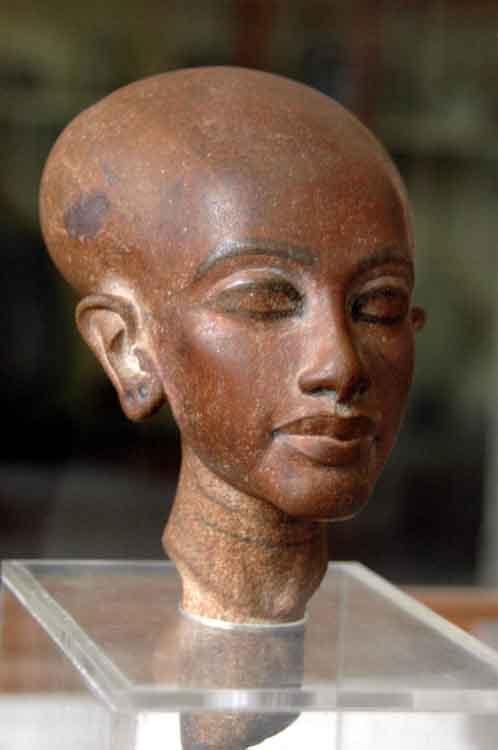
In addition to Dr. Diop’s research, in its geographic DNA study, National Geographic recorded that 68 percent of present-day Egyptians are ethnically North African, with foreign invasions having little influence on the genetics of most modern Egyptians.
Some of the most famous ancient Egyptians have been identified as black. For example, Queen Ahmose-Nefertari is most often identified as a woman of color. “According to Sigrid Hodel-Hoenes, the author of “Life and Death in Ancient Egypt,” the Queen’s black skin color is derived from her role, as black is the color of both the fertile earth and the netherworld and death.”

“The term is a collective noun which thus described the whole people of Pharaonic Egypt as a Black person,” according to Diop.
Reading Bones
Most of the skeletons and skulls of ancient Egyptians had characteristics similar to those of modern Black Nubians and other people of the Upper Nile and East Africa, showing they were Black and African, according to study by scientist Diop.
The Blood Group Tell Us
Also, blood type is evidence, according to Diop. He discovered that even after hundreds of years of intermixing with foreign invaders, the blood type of modern Egyptians is the same group B as West Africa populations on the Atlantic seaboard and not the white race’s A2 characteristic prior to any crossbreeding,’ The Atlanta Star reported.
Mother Tongue Evidence
Also, blood group is evidence, according to Diop. He discovered that even after centuries of intermarrying with foreign invaders, the blood type of modern Egyptians is the same group B as West Africa tribes on the Atlantic seaboard and not the white race’s A2 characteristic prior to any crossbreeding.
“The Atlanta Star reported that Diop clearly indicates that ancient Egyptian, modern Egyptian Coptic, and Wolof are related, with the latter two having their origins in the former.
Diop wrote in the “General History of Africa”: “The relationship between ancient Egyptian and African languages is not a fictional fact, but a demonstrable fact that it is impossible to put aside for scholarship.”
23 notes
·
View notes
Quote
Blacks. ሻንቅላ Šanqəlla. Ethnic term. A pejorative ethnic term used by highland Ethiopians for various ethnic groups living west of the historical Ethiopian kingdom’s border. Such peoples were held in contempt by highland Ethiopians—Christians and Muslims alike—because of their traditional religion, different cultures, Nilo-Saharan rather than Semitic languages, and physical appearance, including a darker complexion. Since the Christian highlanders frequently raided these groups for slaves, the lowlanders’ given ethnic name became synonymous with “slave” itself. The highlanders, of which WP was a member, saw themselves as “red” and the Šanqəlla as “black.” We have chosen not to use the word Šanqəlla, which is now considered very pejorative, but to use the term “Blacks,” which suggests to readers familiar with the American history of slavery that the group was considered lesser and enslavable. In older European texts about Ethiopia, orientalists often glossed the term “Shanqalla” as “Negroid.” The term is not to be confused with barya, which is a different racialized term for slaves. See Smidt (2010b).
Wendy Laura Belcher and Michael Kleiner - Glossary
Galawdewos - The Life and Struggles of Our Mother Walatta Petros: A Seventeenth-Century African Biography of an Ethiopian Woman (2015) [Translated by Wendy Laura Belcher and Michal Kleiner]
12 notes
·
View notes
Text
To all the people trying to make their Amis more diverse in terms of culture/racialization: if you’re setting your story/art in France, a good chunk of them should be Maghrebi or Sub-Saharan African. I don’t have exact statistics, because I don’t think the French government does that kind of polls (the concept of “race” is kind of taboo), but most of France’s immigration comes from ex-colonies, and most of those were in Africa. I’m not saying East Asians, Latinxs or Indians aren’t present at all, but if they are your go-to ethnicities, you’re thinking in terms of US population and not France’s.
Also, you need at least some of them to be Muslim or ex-Muslim. Have some of them not drink. Have halal options for parties. Accommodate meetings for Ramadan. Talk about Islamophobia. A racially diverse group in France with no influence from Islam whatsoever rings very false.
#Les Misérables#text posts#my posts#How to French#mentions of racism#not really but it's the closest tag I have#religion
47 notes
·
View notes
Text
Another day, another worst history/mythology post! It's been awhile.
Now, "x character/historical figure/ethnic group were secretly black!" content is so common that it almost doesn't register anymore, nor is this the first "Worst" entry to feature the idea, but this post was so Wild in its bizarre blanket statements while also mixing some genuine facts in?? that it caught my attention, and brought to mind this great quote from M. R. James

To start, let's look at the plausible stuff.
First they mention some black or potentially black characters in Greek myth, such as Memnon and Andromeda. Both of them are identified with Ethiopia, so that's totally plausible. Cool, with you so far. Then they claim Heracles is black. I'm not used to seeing one-drop-policy applied by Europeans so that's... interesting. A man four generations removed from a single black ancestor would seem more aptly described as "mixed race," but ok, I'll go with it.
Then they bring up a potentially black Zeus in Sophocles' Inachos, which is a genuine debate. However, a single literary description of Zeus hardly seems to set the ethnicity of Heracles in stone, since the gods can look however they want, there are plenty of alternative appearances for Zeus in art/literature, and the genetic inheritance of the gods is, uh, creative at best? Sex with Zeus in swan form produces human-looking babies from eggs, sex with him in eagle form seems to do nothing much special at all, and Hephaestus thinking about Athena while he came made the resulting sperm-baby be born with snake legs. (Don't ask.)
We get into murkier waters with op's statement that Heracles and Apollo should be understood as black because of the sculptures from Veii. Basically according to op, a figure being represented with dark paint or in brown terracotta = the artists' intentions to represent them as "dark skinned" = "dark skinned" must mean black.
And now we get to the core argument of the post, namely, that ethnic Greeks are not white Europeans, but black. As such the Greek gods and heroes were of course, not light-skinned white people, but black. Because you are either Swedish, or Sub-Saharan African, apparently. Op identifies themself as black and distinctly ties their non-whiteness to their Greek identity.

(This is from a point where they imply that Achilles was also black, and that readings of his hair or coloring as light, blonde, or red are incorrect-- his hair color was described to show he was *spins bottle* Angry. Ok.)
So, we've made it to "dark-colored figures in art means black people," "terracotta statuary means black people," and "modern and ancient Greeks are black people because op is. Or something."
Artistic and gender conventions in the ancient Mediterranean don't mean anything apparently. Nor does the presence of dozens of white or light-painted figures either, it would seem. Don't look at these art pieces, then.

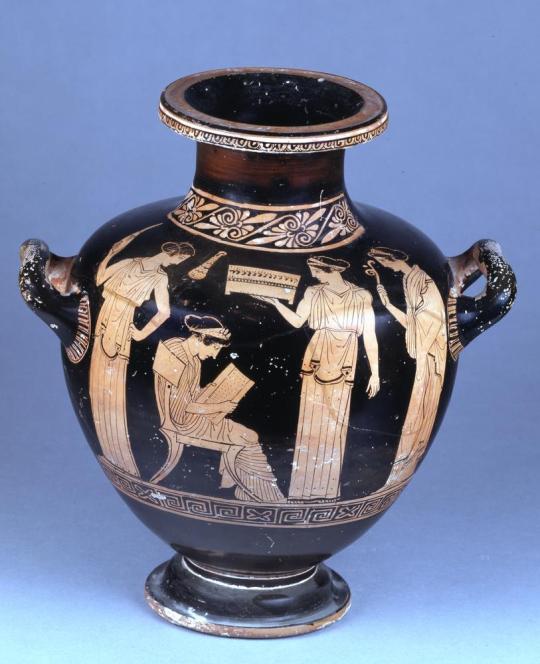





Terracotta, by the fact of its being brown, means anything sculpted with it is apparently depicting black people. (Brown people don't exist??) Also every piece of art that isn't colored, and left in its natural tones also dictates race. Every person represented in bronze or onyx or wood is automatically black. Every person represented in marble or ivory is now automatically white. I'm claiming porphyry for the native americans, so now the four tetrarchs were actually indigenous (#historiansdontwantyoutoknow) And if you were unlucky enough to be immortalized in contrasting color stones, god help you.
There also of course aren't a zillion examples of painted terracotta throughout Greece where the subject is portrayed with light skin.

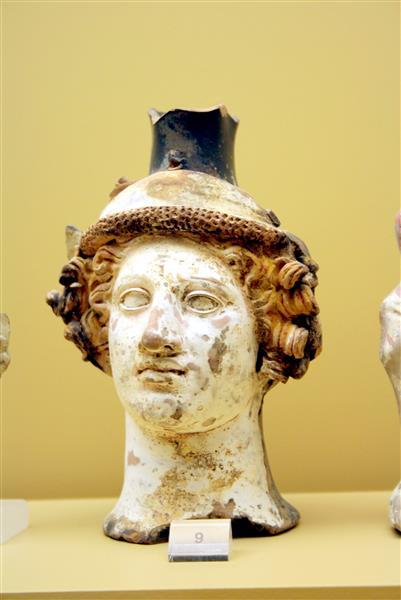
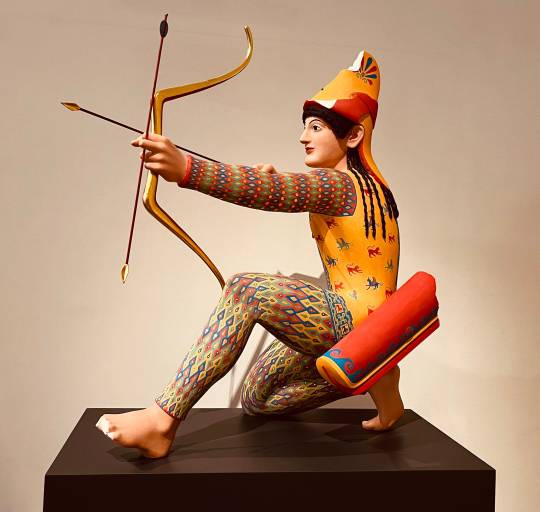


Idk if I'm supposed to just not see these statues? Or if because they were sculpted in terracotta, I'm just supposed to identify them as black somehow? Because if so I can only assume that the ancient Chinese were also black??
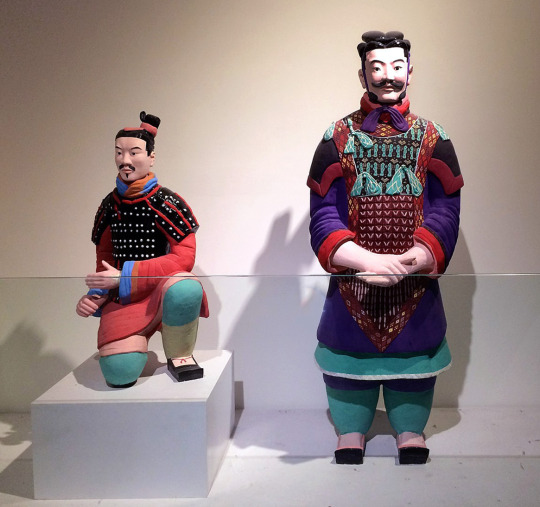
Despite these works (these are the original colors of the famous terracotta warriors) being painted to represent lighter skin and East Asian features, they were terracotta underneath, so we all know they were actually Africans. I'm learning so much.
Well, we've figured out that the Chinese are black, and so are the Greeks--- Romans however, seem to be white?? Maybe??

This whole statement is Interesting, but I'm just concerned with the highlighted bit here because
--the "dark skinned" terracotta statues of Apollo and Hercules op is fixated on aren't Greek. They're Etruscan. Veii was in the heart of Etruria.
So not only does the appearance of these statues have no meaning as far as what the Greeks thought about their own ethnicity one way or another, since this isn't Greek art, but if Romans are white, it would follow that the Etruscans are too? Making the whole presence of these statues in this argument completely null.
Of course like the vast majority of the world, the Etruscans did not consider terracotta an inviolable artistic medium which might not be blemished with the application of paint. They frequently painted their pottery and statuary.

(Oh man, light skinned figure and darker skinned figure together! Pale woman and tanned man! Where have I seen these ideas before? Not in the temple of Apollo at Veii, certainly not!)


The statue of Apollo at Veii has darker colored skin, while the statue of his mother (part of the same temple complex) sports a lighter complexion. This of course, definitely does not represent gender ideals or artistic conventions such as those we can clearly see going on in sarcophagus above. Apollo was black African/Greek and the color of the clay proves this. Is his mother also black then, also being made from terracotta? Or white because her skin is painted lighter? These are Etruscan italian works, so they're white, right? But no, no, we've established they're sculpted from terracotta, so that makes them actually black. So are Italians not white now??? Op help!!
To discuss Heracles again and touch more on those claims about Achilles, what is presented as the deciding factor of why these gods and heroes and the Greeks as a whole must be black?


There you are. All those light-skinned Greek folks in Greek art couldn't possibly be white, or any other race but black, because white people can't survive in Greece without modern science.
We all know that black people are universally invulnerable to sun-stroke, and that pre-sunscreen white Europeans swooned away to nothing like sensitive victorian heroines at the mere touch of sunlight. The Romans, Etruscans, Italians in general, Spaniards, and Southern French, apparently, were ok because the heat of Greece specifically is more threatening to weak white flesh than the entire rest of the Mediterranean-- only poc can survive in the hellish wastes of the Aegean.

(White person or vampire?? increasingly hard to tell).
So where does this put the numerous light-skinned figures in Greek art? Including light-skinned representations of op's supposed dark-skinned heroes? And Etruscan works that they claim are black Greeks? Well, now we're getting into a gray area that they don't provide us much context for, so I'm going to have to interpret for myself. This little tidbit might give a hint, though.

This could definitely not mean she restored a manly, youthful look to him (fit, tan, no longer grizzle-haired). Of course, if Athena had to artificially darken him, would that make this the first case of blackface? Or is op implying Odysseus was trans-racial? Does that make Odysseus the only white Greek? Or was he not actually Greek till Athena apparently transformed him into a black man? Does op want me to believe the entirety of Greece, despite different skin tones and origins, have been magically altered into black people through Athena's divine intervention?? Fascinated to know.
#felt very snarky this morning you can tell#anyway!#worst history/mythology post series#the ancient world#ancient greece#ancient history#lore and more#greek mythology
2 notes
·
View notes
Note
“Today I’m worrying about catastrophic ecosystem collapse. What if it gets just a little too hot or a little too acidic a little too fast in the ocean, and some important keystone species goes extinct and it fucks up the nitrogen cycle or oceanic oxygen production or kills off all the fish and the whole of Earth’s ecosystem just goes kaput then and there? Very concerning.” Don’t worry about it, nothing bad will happen if an important species goes extinct. Sub-Saharan Africans and Hispanics will simply fulfill the role that that old species used to fill, and they’ll do it for a lot cheaper
Human ethnic groups do not fill ecological niches the way species do. At least, they don't unless a given society has forced them into that role. There are certainly societies where a given ethnic group, or other type of social group, is relied on for (and thereby often coerced into) a specific kind of labor—see the burakumin in Japan. But these situations are socially constructed. It doesn't actually need to be burakumin doing meat processing, anybody could do that!
In ecosystems, organisms are generally hyper-specialized for a particular niche. This is what makes the loss of an organism so potentially devastating. Ecosystems are delicately balanced towers that rely on each species doing its job. In human society, the appropriate analogy is professions, not ethnic groups.
This would be obvious, frankly, upon any contemplation at all. Your implicit assertion ("if we allow widespread immigration, white people will go extinct, which will cause a catastrophic collapse of human society") is ludicrous on the face of it; it relies on a strained analogy that doesn't take the specifics of either situation into account. It is nonsense designed to prop up your agenda, not reasoned argument.
And, once again, I will clarify that I have no desire to eliminate white people! I just don't want to restrict human freedom en masse in order to preserve whiteness or whatever, because that is very silly.
Finally, it's worth noting that as far as I can tell, white people aren't even in any danger of "going extinct". Like, they're not a threatened group! This is all purely hypothetical on your part! It's nonsense!
#society#I didn't want to comment on it in the body of the post because it's not relevant to the point I'm making#but there is something so hateful in the way you have phrased this anon#I mean this in full sincerity: if you care about truth and value self-honesty#I would recommend contemplating how much of your opinions here are based on reasoned argument and how much are based on#a gut level dislike of black and/or latin american people#because there is a gut level dislike which comes through in your anons#and for the sake of *your own ability to reason* I believe it would behoove you to contemplate if it is affecting your judgement#please don't tell me the result; you can keep them to yourself one way or the other. if you send a message telling me I won't respond
25 notes
·
View notes
Text
“Politicians and cultural leaders have made various assertions that homosexuality was never practiced in traditional sub-Saharan Africa during precolonial times. Such statements generally suggest that it was imported from outside sub-Saharan Africa with Arabs and colonialists often being blamed for it. […]
It has been documented that homosexuality is as indigenous to Africa as heterosexuality. Many practices that occurred across the continent could clearly be regarded as same-sex ones, [including] woman to woman marriages, which take place in more than 40 ethnic groups spread across sub-Saharan Africa from South Africa, through Benin and Nigeria, to Kenya and South Sudan. Others that were accepted in some African societies of the past include men treated as women, for example such individuals among the Langi in Uganda might even be allowed to marry men. Ancient paintings and traditional dances in language provide evidence of a history of a Mystic surety in the continent. […] Furthermore, many indigenous languages contain words that refer to homosexuality, for example, the Lugandan word bisiyaga. […] In the Shona language the words murumekadzi and mukadzirume can be loosely translated as man woman and woman man respectively. The first refers to a man who takes on female roles and the second to a woman who takes on male roles. […] However, these practices may not easily fit within today’s description of same-sex relations and tags like ‘LGBTI’. They had many different purposes, perhaps the least of which were sexual pleasure. For example, men who took on female roles would sometime do so because they were possessed by spirits –that is, they were acting as mediums for female spirits. It is important to note that the individuals involved in such practices usually conformed to the dominant heterosexual way of life. They went on to marry, have children and be part of heterosexual/heterocentric families. In this sense, such persons were similar to those of today described as ‘in the closet’.
It is also important to note that some of these practices were documented more by non-Africans than Africans, usually with highly disparaging language. The heterosexist worldview of these authors perhaps prevented them from setting the practices more thoroughly and thus discerning their real nuance, meaning and significance. For example, the Buganda king, the Kabaka, is commonly referred to as a Bbaffe, which loosely translates as ‘our husband’. Used by men and women in reference to the king, the term could easily be mistaken as meaning that the Kabaka was literally a husband to both men and women in the kingdom, and it was acceptable for him to have physical relations with both sexes.
Another vivid example can be found in the Portuguese descriptions regarding the Shona Kingdom of Mutapa and its king, or Mwene Mutapa. The Portuguese described the Mwene Mutapa’s advisers as ‘women’, which was due to literal translation of the term used for them. The implication was that, since they were regarded as women, the king treated them as his wives and could perhaps have sex with them.
These precolonial practices were not necessarily encouraged in these societies, but nor were they necessarily punished. Precolonial African societies tended to place an extremely high and prodigiously over determined value on heterosexual marriage and reproduction. Individual sexual desire was largely subsumed to the broad interests of the extended family or lineage. Despite this, individuals were often given leeway to veer from accepted gender roles and sexual practices, provided they do not affect the broader interest of society. As such, homosexuality –just like celibacy and adultery– was deliberately not encouraged but at the same time it was not suppressed. Such things were simply ignored and hardly discussed. This is perhaps the source of the strange consensus that there was no homosexuality in traditional Africa.
More importantly, these practices were not criminalised. All African societies had established social norms, and deviance was usually punished. For sexual deviance the punishments were particularly heavy, and so, if heterosexuality was one norm from which no deviation was allowed, punishments for homosexuality would have been prescribed. Thus, the fact that there seems to be no designated punishment for same-sex relations points towards tacit acceptance of these practices, rather than the assertion that they did not exist. Indeed, it could be said that it was colonialists who first introduced criminalisation of homosexuality.”
-Adrian Jjuuko and Monica Tabengwa, “Expanded criminalisation of consensual same-sex relations in Africa: contextualising recent developments”, in Envisioning Global LGBT Human Rights, (Neo)colonialism, Neoliberalism, Resistance and Hope (2018)
#queer history#queer stuff#precolonial history#i love this book sm#also lol at everyone blaming arabs and persians for homosexuality sorry for being the og i guess
8 notes
·
View notes
Text
question/discussion topic for my black american followers:
have you heard of soulaan as a word to describe us? and if so, what do you think of it?
for those that don't know, soulaan is an endonym (i.e created by us) for our ethnicity that was coined over a year ago. the base 'soul' comes from our culture that includes soul food and soul music, while the ending '-aan' comes from "african american nation". variants include: soulaa and soulaani (both of which can have the double aa or single a)
i thought it was nice but then i saw concerning stuff like this that made me go "yikes":
some of the people that use it are black separatists, use it to fuel diaspora hostility, etc.
it doesn't seem very popular right now outside of like tiktok or pinterest. but it's been gaining popularity throughout 2023.
some people criticize it as not wanting to learn our individual ancestry blends (i.e the ethnic groups we'd get from a dna test)
personally i'd be fine with the term because as i see it, this would make it less controversial both in and out of our identity:
afro-american/black american: anyone of full or partial sub-saharan african ethnic descent who are citizens or permanent residents of the united states. (race + nationality)
soulaa: any black american who's culture and heritage is tied to the united states. (ethnicity)
american descendant of slavery/foundational black american: any soulaani that uses their identity to push a, usually nationalist, separatist, or supremacist political stance. (ethno-political identity)
from my understanding, any polarity in regards to the current terms stem from:
people confusing denonyms, ethnonyms (endonyms and exonyms), and ethnotopynyms with each other
identities and labels are very different between countries + identities that start with afro-/black aren't usually ethnicites outside of the americas
polysemic vs monosemic terms (e.g being "black" can be referring to race or the american ethnicity)
probably some other stuff i forgot to add
also, to me, the word is just cute and fun to say. "sō-lahn" haha 🥰 i think i'll try using the term to see how i like it.
feel free to correct me on any definitions that might be incorrect!
#black academia#black studyblr#black culture#black people#black americans#african american#afroamerican#black tumblr#black american#sociology#ethnicity#anthropology#discussion
10 notes
·
View notes
Photo
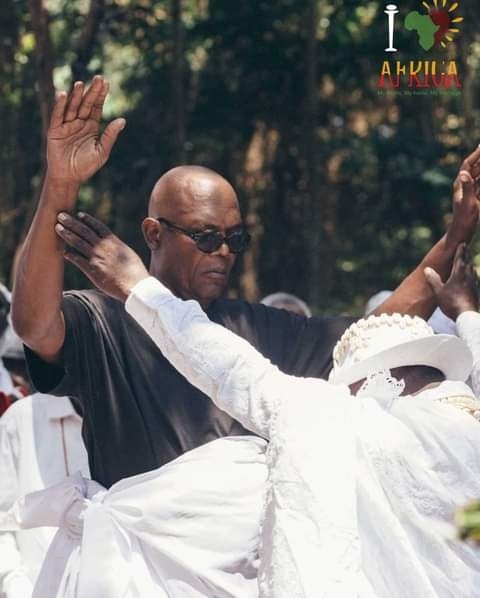


American actor Samuel L. Jackson traces his origins back to the Bantu tribe of Gabon
The Bantu people are the speakers of Bantu languages, comprising several hundred indigenous ethnic groups in sub-Saharan Africa, spread over a vast area from Central Africa across the African Great Lakes to Southern Africa.
He was welcomed as a lost son by the Benga people and was inducted into the Benga tribe, with rare and unprecedented access to secret ceremonies and local customs.

#kemetic dreams#samuel l jackson#gabon#bantu#african#africans#african ancestry#dna#african dna#dna test
269 notes
·
View notes
Text
Misrepresentations of Egypt(ians) in the Media
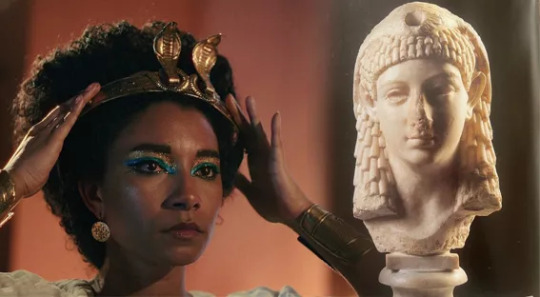
Adele James playing Cleopatra in Netflix's Cleopatra (2022), vs. a statue of Queen Cleopatra.
Afrocentrist narratives misrepresent Egypt and Egyptians in Pop-Culture despite ample scientific and historical evidence that prove those narratives wrong.
This blog attempts to investigate the mechanisms and agendas of how Afrocentrist narratives and relevant ethnic and racial misrepresentation of Ancient Egyptians manifest in the various forms of multimodal digital media and pop-culture, from an Egyptian perspective. It also aims to delineate the repercussions of Afrocentrism on the history and heritage of both: Egypt and Sub-Saharan African nations, mainly to prove that Afrocentrism only ensures the spread of racist hate speech towards Northern Africans whose skin is not black rather than celebrate the greatness of the long shunned Sub-Saharan African heritage. Afrocentrism should be about reviving the tribal heritage the Black peoples of Africa instead of claiming credit for other nations’ history. This paper will basically criticize the pseudohistorical Afrocentric narrative that is advertised in Pop-Culture, official museum displays of defaced replica of Ancient Egyptian statues to have Sub-Saharan features, as well as theatrical and cinematic normalization of the image of Ancient Egyptians played by Black actors. The results of the ongoing Afrocentric (social) media campaign can only fuel socio- and geopolitical conflict among the peoples of Africa as well as further bury the Sub-Saharan precolonial heritage by only focusing on falsely proving their ownership of Ancient Egyptian accomplishments.
Since the 1970s, Afrocentricity/Afrocentrism has been around, defying logic, history, and science. Yet, somehow this culturally-appropriating narrative has found its way out of the founding academic papers into a lot of recent media productions such as: Netflix’s 2023 ‘documentary’ “Cleopatra” in which the Macedonian-Egyptian Queen and other Egyptian characters are portrayed Black, to which Egyptians reacted in a social media campaign to defend the attempt to blackwash their history through falsifying information that definitely arise from an agenda. This Afrocentric belief is advertised by celebrities, like Michael Jackson in his music video “Remember the Time” in the 1970s; Beyoncé and Rihanna who portrayed Queen Nefertiti in a Dutch museum and on Vogue cover respectively (Yee), in 2023; as well as Kevin Hart who supported a group of animators on the TV program “Shark Tank”, granting the team Black Sands Entertainment around $500,000 to promote Afrocentrism through Anime and Comics, resulting in an online backlash from Egyptians under the hashtag #CancelKevinHartShow that led to taking down his stand-up comedy show that was scheduled to take place in February – also in 2023 (Nowar). It is worth mentioning that the academic world as well is still actively pushing for Afrocentric ideology, as a group of African American professors had planned the One Africa Conference in February 2022 to take place in Aswan, and the Egyptians reacted with the hashtag #stopafrocentricconference, and it was indeed taken down (Aidi).
Hence, the movement is currently celebrated by a lot of Black people, especially African Americans, who engage in online campaigns, supporting the spread of the false Afrocentric beliefs promoted in popular media, especially in the last couple of years. In resistance, the Egyptians are launching awareness campaigns and resisting any potential promotion of the Afrocentric theory, counter-arguing with factual evidence. The author of this paper is just one more Egyptian who is adding to the corpus of Anti-Afrocentric dialogue in an attempt to academically refute the Afrocentric allegations against the Egyptians as the rightful heirs to their ancestor’s legacy, highlighting the jeopardies of falsifying history for both, Sub-Saharan and Egyptian heritages, as well as the underlying malicious agendas fueling the Afrocentric racist discourse.
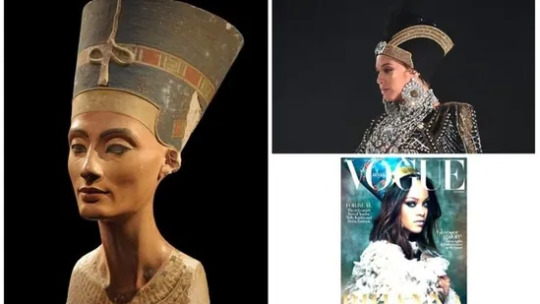
An exhibition in a Dutch museum that depicts black American singers, entertainers, and artists like Beyonce and Rihanna as the pharaohs of ancient Egypt has sparked a cultural conflict.(Wikimedia Commons/Twitter)

"Remember the Time" by Michael Jackson, behind the scenes.
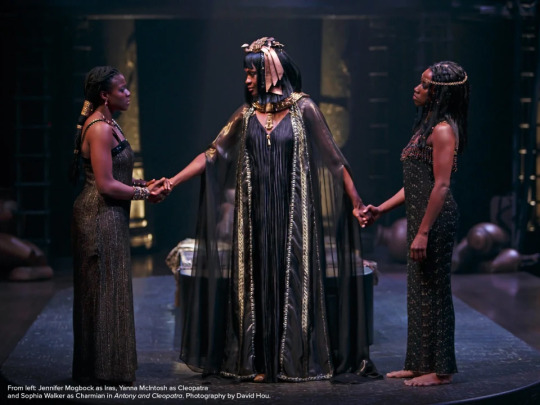
Anthony and Cleopatra, Stanford Festival (2015), directed by Barry Avrich.
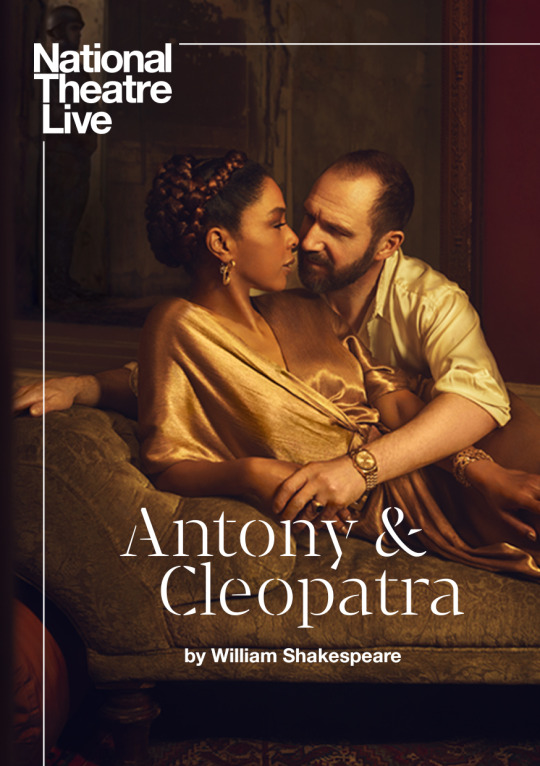
Ralph Fiennes and Sophie Okonedo (black actress, obviously) play Shakespeare’s famous fated couple in his great tragedy of politics, passion and power. Directed by Simon Godwin (Romeo & Juliet, Hansard).
Data Collection/Analysis Methods
Since this research is focused on analyzing the misrepresentations of Ancient Egyptian heritage in pop-culture, particularly social media posts and media productions, the primary resources would be materials collected from Facebook, Twitter, Instagram, Tiktok, as well as some media productions, like the abovementioned works. Also, less popular productions, like Anthony and Cleopatra which presented by The National Theatre of Britain in 2018 in which all the Egyptian character, including Cleopatra, were portrayed by black actors. Some secondary resources would include newspaper reports and social media conflicts. To illustrate, Netflix’s mini-series “Cleopatra” (2023) received its fair share of criticism until its genre was officially changed from ‘documentary’ to ‘fictionalized’ story, with some Egyptian lawyers suing Netflix for the falsification of history, while the mini-series received a terribly low rate on IMDB and other platforms. Meanwhile, Afrocentrics were reactive on social media, defending their beliefs and cheering for the latest Cleopatra, supporting their argument with nothing more than photos from their trips to Egypt, posing with the monuments, and writing captions that explicitly denote that they are “back home”, following the steps of famous celebrities who also do this. In another backlash, Egyptians started spreading cultural awareness about the Egyptian identity in an unprecedented enthusiasm to promote a stronger sense of identity and educate their social circles about the dangers of the Afrocentric beliefs and the importance of standing up for our culture on (social) media. All of these social media interactions can serve as a well of resources to study the phenomenon in question.
P.S. A random social media user once commented: "Egyptians can't have been black. They used black eyeliner and it was easy to see, unlike the actress who had to put a ton of golden glitter and blue outline for the outliner to be that visible!"
References
Agnihotri, Akanksha. “Dutch Museum’s Beyonce Exhibit Sparks Controversy in Egypt.” Hindustan Times, 21 July 2023, www.hindustantimes.com/lifestyle/art-culture/dutch-museums-beyonce-exhibit-sparks-controversy-in-egypt-101689926841925.html.
“Antony & Cleopatra.” National Theatre at Home, www.ntathome.com/antony-and-cleopatra. Accessed 16 Feb. 2024.
Aidi, Hisham. “Egypt and the Afrocentrists: The Latest Round.” Africa Is a Country, 2022, africasacountry.com/2022/03/egypt-and-the-afrocentrists-the-latest-round#:~:text=By%20mid%2DFebruary%2C%20the%20One,of%20an%20abiding%20Arab%20racism.
Nowar, Mariam. “Kevin Hart and Afrocentrism: Why Some Want His Show Cancelled in Egypt.” El-Shai, 13 Dec. 2022, www.el-shai.com/kevin-hart-and-afrocentrism-why-some-want-his-show-cancelled-in-egypt/.
Yee, Vivian. “Black Artists Embrace Ancient Egypt. Egyptians Aren’t Happy about It.” The New York Times, The New York Times, 18 June 2023, www.nytimes.com/2023/06/18/world/middleeast/egypt-african-dutch-museum.html.
"Stratford Festival: Antony and Cleopatra." IMDb, IMDb.com, 4 Sept. 2016, www.imdb.com/title/tt4144932/.
3 notes
·
View notes
Text

The Hausa are the largest ethnic group in sub-Saharan Africa and their Nilo-Saharan language Hausa is the most spoken language in sub-Saharan Africa after Swahili.
Numbering approximately 80 million, the Hausa are centred in the Sahelian and sparse savannah regions of southern Niger and northern Nigeria, but a significant number can also be found in the western, central and eastern African countries of Gabon, Senegal, Gambia, Equitorial Guinea,Togo, Benin, Ivory Coast, Ghana, Burkina Faso, Mali, Algeria, Chad, Sudan, Cameron, Republic of Congo, and Central African Republic.
During the second half of the last millennium the Hausa founded Islamic empires which are recognized among the then wealthiest and culturally advanced in the world and greatly influenced Europe's emergence from the dark ages. Their principal cultural centers are Katsina, Sokoto and Timbuktu.
The Hausa have a long tradition as traders dating from centuries ago when they controlled trans-Saharan trade with North Africa. Today they are primarily traders, pastoralists, and farmers, but it is for their well established equestrian culture that they are known today.
For centuries, horses have been an important part of their lives and feature prominently in their cultural festivities and celebrations adorned with colorful fabrics and bronze ornaments.
Their horses are predominantly of the Dongola-Barb breed from Dongola in Northern Sudan interbred with Arab horses and ridden by their acclaimed horsemen and women.
PS: The richest man in Africa, Aliku Dangote, is Hausa.
Guys let's get our YouTube channel (YT: Historical Africa) to 70k subscribers. Kindly click on the link to subscribe https://youtube.com/c/HistoricalAfrica
21 notes
·
View notes
Text
The Cultural Capital of AngloWest Africa - Ghana 🇬🇭
Ghana in 2021, the estimated population of Ghana is approximately 31.4 million people. The country has a relatively young population, with approximately 57% of the population under the age of 25. The population is also growing rapidly, with an annual population growth rate of 2.15%.

The ethnic composition of Ghana is diverse, with over 100 different ethnic groups. The largest ethnic group is the Akan, who make up around 47% of the population. Other significant ethnic groups include the Mole-Dagbon, Ewe, Ga-Adangbe, and Gurma.
The official language of Ghana is English, but there are many other languages spoken throughout the country, including Akan, Ewe, and Twi. The majority of the population is Christian, with approximately 71% of Ghanaians identifying as Christian. There is also a significant Muslim population, making up around 18% of the population, and a smaller population of traditional African religion practitioners.
Ghana has a relatively high urbanization rate, with approximately 56% of the population living in urban areas. The capital city, Accra, is the largest city in Ghana, with a population of over 2.2 million people. Other major cities in Ghana include Kumasi, Tamale, and Sekondi-Takoradi.

The median age in Ghana is approximately 21 years, and the life expectancy at birth is around 65 years. The literacy rate in Ghana is relatively high, with approximately 76% of the population over the age of 15 being able to read and write.
Major Health Conditions
Most prevalent health conditions in Ghana include:
Malaria: Malaria is a major public health problem in Ghana, accounting for approximately 29% of all outpatient visits, 25% of all admissions, and 22% of all deaths.
Acute Respiratory Infections (ARI): ARI is a leading cause of morbidity and mortality in Ghana, particularly among children under five years old.
Diarrheal Diseases: Diarrheal diseases are common in Ghana, with an estimated 13% of deaths in children under five years old attributed to diarrhea.
Tuberculosis (TB): TB is a major health problem in Ghana, with an estimated 14,000 new cases reported in 2020.
Neglected Tropical Diseases (NTDs): NTDs, including schistosomiasis, lymphatic filariasis, and onchocerciasis, are endemic in Ghana and affect millions of people.
Non-communicable Diseases (NCDs): NCDs, such as cardiovascular diseases, diabetes, and cancer, are on the rise in Ghana due to changing lifestyles and increasing urbanization.
Acne or Pimple or Blemish
Acne is a common skin condition that affects millions of people worldwide, including those living in Ghana. However, there is limited research available on the prevalence and epidemiology of acne and pimples in Ghana specifically.
One study conducted in Ghana in 2019 examined the prevalence of acne and associated risk factors among students at a tertiary institution. The study found that the overall prevalence of acne was 59.5%, with females being more affected than males. The study also identified several risk factors for acne, including stress, family history, and certain dietary habits.
Another study conducted in 2017 investigated the prevalence of acne and its impact on the quality of life of Ghanaian students. The study found that 67.9% of the participants had acne, and that acne significantly impacted their quality of life in terms of social interactions and self-esteem.
Overall, while limited research exists on the prevalence and epidemiology of acne and pimples in Ghana, available studies suggest that acne is a relatively common skin condition among Ghanaians, particularly among young people. Further research is needed to better understand the epidemiology and impact of acne in Ghana and to develop effective prevention and treatment strategies.

Acid Reflux - The sour fluid
Studies have reported a high burden of gastrointestinal (GI) diseases in sub-Saharan Africa, including Ghana. According to a systematic review published in 2016, the most common GI disorders in sub-Saharan Africa are infectious diarrhea, helminth infections, and viral hepatitis, among others.
Furthermore, a study published in the West African Journal of Medicine in 2010 reported that upper GI symptoms, including heartburn and acid regurgitation, were prevalent among Ghanaians. The study also found that the use of non-steroidal anti-inflammatory drugs (NSAIDs) was a significant risk factor for upper GI symptoms.
Another study published in the Journal of Gastroenterology and Hepatology Research in 2018 reported a high prevalence of irritable bowel syndrome (IBS) among Ghanaians. The study found that IBS affected 20.7% of the study participants and that females were more affected than males.
Studies suggest that digestive problems are prevalent in Ghana. The most common GI disorders in Ghana are infectious diarrhea, helminth infections, and viral hepatitis. Upper GI symptoms and IBS are also prevalent in Ghana.

Loving thyself is paramount
Male libido problems are not unique to Ghana, as they affect men all over the world. However, there are certain factors specific to Ghana that may contribute to male libido problems, including cultural and societal norms, access to healthcare, and lifestyle factors.
In Ghana, there is a cultural emphasis on masculinity and sexual prowess, which can lead to feelings of shame or inadequacy for men who struggle with low libido. This can make it difficult for men to seek help or talk openly about their issues.
Access to healthcare can also be a barrier for men in Ghana who are experiencing libido problems. Some men may not have access to medical facilities or trained healthcare professionals who can provide appropriate treatment.
Lifestyle factors such as poor diet, lack of exercise, and high levels of stress can also contribute to male libido problems in Ghana. These factors can lead to issues such as obesity, diabetes, and high blood pressure, which are all risk factors for low libido.
To address male libido problems in Ghana, it is important to address these underlying factors. This may involve promoting a more open and accepting attitude towards male sexual health, increasing access to healthcare services, and encouraging healthy lifestyle behaviors. Additionally, healthcare providers can offer treatments such as counseling, medication, and lifestyle interventions to help men overcome their libido problems.

The Size of Prize
The pharmaceutical industry in Ghana has been growing steadily over the years. According to a report by the Ghana Investment Promotion Centre (GIPC), the industry's value was estimated to be around $630 million in 2019, with an annual growth rate of 6.8%. The government of Ghana has been implementing policies to promote the development of the pharmaceutical industry, with the aim of achieving self-sufficiency in drug production.
The pharmaceutical industry in Ghana can be categorized into the following products:
Generic drugs: These are drugs that are not branded and are marketed under their chemical names. They are cheaper than branded drugs and are essential in providing affordable healthcare.
Branded drugs: These are drugs marketed under a brand name and are usually more expensive than generic drugs. They are protected by patents, which give the manufacturer exclusive rights to produce and market them.
Over-the-counter (OTC) drugs: These are drugs that can be bought without a prescription from a healthcare provider. They are usually used to treat common ailments such as headaches, colds, and coughs.
Medical devices: These are instruments, machines, and apparatus used to diagnose, treat, or prevent disease.
The Ghanaian pharmaceutical industry is dominated by local manufacturers who produce generic drugs, with only a few multinational companies operating in the country. The government of Ghana has been implementing policies to promote the development of the pharmaceutical industry, including tax exemptions and incentives for local manufacturers. The industry is also regulated by the Food and Drugs Authority (FDA).
Nature Offers More
The herbal over-the-counter (OTC) products market in Ghana is a significant segment of the country's healthcare industry. Ghana has a rich tradition of herbal medicine, and many Ghanaians rely on traditional herbal remedies to treat various health conditions. The demand for herbal OTC products has been increasing in recent years due to a growing interest in natural and alternative medicine.
Some of the commonly used herbal OTC products in Ghana include herbal teas, capsules, powders, and creams. These products are made from a variety of herbs and plants, such as aloe vera, ginger, neem, moringa, and turmeric. They are marketed as remedies for a range of ailments, including digestive disorders, skin conditions, and respiratory problems.
The herbal OTC products market in Ghana is largely unregulated, and many of these products are sold without proper quality control or safety testing. However, the Ghana Standards Authority has established guidelines for the manufacture, labeling, and packaging of herbal products to ensure quality and safety.

The market for herbal OTC products in Ghana is highly competitive, with many small-scale producers and distributors. However, some larger companies have entered the market, such as Phyto-Riker Pharmaceuticals and Ernest Chemists Limited, which have established themselves as leading manufacturers and distributors of herbal products in Ghana.
Overall, the herbal OTC products market in Ghana is growing, driven by a strong demand for natural and traditional remedies.
The Access Points
There are various distribution channels for over-the-counter (OTC) and fast-moving consumer goods (FMCG) products. Some of these distribution channels include:
Traditional Trade: This involves the use of small independent retailers such as mom-and-pop stores, kiosks, and corner shops. They are typically located in residential areas and are convenient for consumers to access.
Supermarkets/Hypermarkets: These are larger stores that offer a wider range of products and are typically located in commercial areas or shopping malls.

Pharmacies and Drug Stores: These are stores that specialize in the sale of pharmaceutical and healthcare products. They are typically located in urban areas and are often frequented by consumers seeking OTC products.

Direct Selling: This involves the use of a network of independent distributors who sell products directly to consumers. This method is commonly used for products such as cosmetics and personal care items.

Online Retail: With the rise of e-commerce, online retail has become an increasingly popular channel for the distribution of OTC and FMCG products. Online marketplaces such as Jumia, Konga, and Jiji have become prominent players in the Ghanaian retail market.
Wholesalers and Distributors: These are companies that buy products in bulk from manufacturers and sell them to retailers. They are often used by manufacturers to reach a wider market.
The distribution channels for OTC and FMCG products in Ghana are diverse, ranging from traditional trade to online retail. Manufacturers often use a combination of these channels to ensure their products are widely available to consumers.
2 notes
·
View notes
Text
AI GENERATED DNI LIST
linebreaks are there because tumblr has a limit on how many text characters can be in each text block
DO NOT INTERACT: transphobes, opponents, internet trolls, religious bigots, zealots, alt-right snoops, enemies of human rights, Zionists, billionaires, for-profit colleges, the 1 percent, evangelical Christians, the 6,741 kids in Broward County, Fla., who will not be attending college, Marco Rubio, any other capitalist profiteer, Donald Trump, any other author, cartoonist, celebrity, anyone in the news who gets big media attention, anyone in the military, teachers, other public school employees, any activists, any protesters, anyone from the Castro, Duterte, Sisi, Erdoğan, Al Sisi, Hun Sen, Rajapaksa, Macri, al-Sisi, al-Sisi, Erdoğan, Putin, Assad, or the armed forces of any of these countries, anyone who "believes in God," anyone who says "God Bless America," anyone who holds beliefs that "they don't agree with," anyone who identifies with any of the groups identified above, anyone who disagrees with them, anyone who is a specific race, ethnicity, gender, religious or sexual orientation, anyone who holds anti-war views, anyone who is gay, lesbian, bisexual, transgender, bi, asexual, or questioning, anyone who is pro-choice,
anyone who is pro-marriage equality, anyone who has a foreign accent, anyone who wears funny glasses, anyone who is female, male, or non-binary, anyone who is of the Middle Eastern, North African, South Asian, North African, sub-Saharan African, Arabian or Sub-Saharan Asian, South Asian, or Eurasian, Asian, or East Asian ethnicities, anyone who has a skin color or hair color that is less than "white," anyone who is of Asian ancestry, anyone who is disabled, anyone who is younger than 50, anyone who lives in a household of less than four people, anyone who has disabilities, anyone who works in health care, anyone who is a student, anyone who is a military veteran, anyone who is the child or parent of a veteran, anyone who is a veteran of the Armed Forces of the United States, anyone who is poor, anyone who has trouble finding a job, anyone who struggles with hunger, anyone who is unemployed, anyone who is a single mother, anyone who is in prison, anyone who has been in jail, anyone who suffers from cancer, anyone who is an abused child, anyone who has been bullied, anyone who has a learning disability, anyone who has a physical disability, anyone who has a visual impairment, anyone who has a learning disability, homophobes, racists, sexists, sadists,
misogynists, subhuman monsters, anything that supports rape culture, racists, and people who espouse homophobic and transphobic beliefs, basically anyone who stands in the way of your ability to think critically and respectfully, or does not respect women, LGBT people, people of color, and/or other disenfranchised people, this includes anyone who is a plant, a member of law enforcement, a capitalist, an evangelical Christian, anyone who advocates for animal rights, anything that you think looks like dirt, rubbish, refuse, refuse, trash, litter, refuse, litter, anything that you think is a disgusting reminder of humanity's wastefulness and abuse of the planet, someone who works for the Department of Justice or the Department of Education, anyone who believes in God and the Christian God, someone who expresses a belief in a deity or an afterlife, someone who favors and defends traditional marriage, someone who opposes gay marriage, someone who is pro-choice or anti-abortion, anyone who thinks B'er Smitt the Clabberdiggle isn't Green Picard, someone who supports boycotting Israel, anyone who identifies with Judaism, or someone who supports Judaism or any other religion, anyone who hates homosexuals, Islam, Christianity,
liberalism, atheism, or believes in a "golden rule," anyone who favors an aggressive foreign policy, anyone who worships anyone or anything other than Allah, Judaism, Christianity, or the Christian God, anyone who is pro-life, anyone who is a supporter of President Donald Trump, anyone who has a long red "Make America Great Again" hat or "Hillary for Prison" T-shirt, anyone who favors the death penalty, anyone who opposes any form of gun control, anyone who advocates for religious exemptions to civil rights laws, anyone who supports racism, sexism, Islamophobia, homophobia, transphobia, and xenophobia, anyone who is a Trump supporter, or anyone who supports or is in favor of any Republican nominee for President since Ronald Reagan (anything that person has ever said or done), anyone who thinks the current US president is doing a good job, and anyone who has any image of what white or non-white people are, who identify as white, male, female, straight, gay, trans, non-binary,
or otherwise, anyone who identifies as female, or anyone who identifies as female, or anyone who identifies as female and has been female since birth or born as a female, or anyone who identifies as male, or anyone who identifies as male and has been male since birth or born as a male, or anyone who identifies as female and was born as a female , or anyone who identifies as male, or anyone who identifies as transgender, or anyone who is black, Latino/a, Asian, Pacific Islander, Native American, Arab, Muslim, Christian, Hindu, Sikh, Buddhist, Catholic, atheist, or an atheist who is a woman, in any way, or anyone who identifies as a Democrat or supports Democrats, someone who supports a gun ban, someone who advocates for the abolition of money, someone who advocates for communism, someone who advocates for religious liberty, someone who favors or is a supporter of the Tea Party, someone who advocates for a more economically and socially just society, anyone who opposes capitalism, a person who holds a membership in any organization associated with the Republican Party, a US Republican politician, and anyone who is a supporter of Tea Party or the Constitution Party, anyone who is a right-wing religious group, or someone who is generally pro-establishment and pro-status quo, anyone who is a fan of any celebrity or sports player, anyone who hates women or is in a relationship with one or is transgender, anyone who thinks men are superior to women, anyone who has ever killed a woman or is in a relationship with one or is transgender, anyone who uses racist,
homophobic, transphobic, sexist, or ableist language, anyone who fancies yourself a feminist or a woman, anyone who advocates for a strong national defense, anyone who is in favor of government authority over the average individual's life, anyone who is in favor of privatizing and/or abolishing social welfare programs, anyone who is in favor of allowing the US government to disregard the Constitution and declare a martial law or even have a military coup to achieve whatever ends they want, anyone who is anti-government, anyone who supports a foreign policy of aggression and militarism, anyone who is a foreign policy hawk, anyone who is in favor of illegal wars, anyone who is pro-Republican political parties, anyone who favors the increase of the National Debt, anyone who favors an expansion of privatization and corporatism, anyone who favors a gun ban, anyone who supports same-sex marriage, anyone who supports gun control, anyone who favors full reproductive rights for women, anyone who supports "feminism," anyone who supports women's suffrage, anyone who supports Islam, anyone who supports any form of racist, sexist, xenophobic, transphobic, homophobic, Islamophobic, and/or transphobic thinking, anyone who supports Israeli apartheid, anyone who supports the empire, anyone who is pro-war, anyone who supports an elite of big government elites, anyone who supports the replacement of free-market capitalism with a government-run economy, anyone who favors any form of capitalism, anyone who favors dictatorship, anyone who favors oligarchy, anyone who favors corporate welfare, anyone who favors anti-market individualism,
anyone who favors crony capitalism, anyone who is pro-war, anyone who is pro-financial sector welfare and deregulation, anyone who is anti-government, anyone who favors privatization, anyone who favors any of the economic policies that benefit the ruling elite, anyone who is pro-war, anyone who is pro-terrorism, anyone who supports terrorism, anyone who supports violence, anyone who supports any kind of religious oppression, anyone who is racist, sexist, xenophobic, transphobic, homophobic, Islamophobic, or ableist, anyone who supports censorship, anyone who supports any of the austerity policies and other government policies that have been causing the current economic crisis, anyone who is pro-war and has ever voted for a war or supports any war in the past, anyone who supports the resurrection of the Moon-Beast, anyone who supports the belief that the earth is flat, anyone who supports the "New World Order," anyone who supports the bible, anyone who believes in a literal, Utopian world and that Jesus was God, anyone who believes in fairy tales, anyone who worships the Moon-Beast,
anyone who believes that 9/11 was an inside job, anyone who believes that Barack Obama was not born in the United States, anyone who believes that 9/11 was a conspiracy, anyone who believes in "3-D," anyone who believes that the bible is the inerrant word of god, anyone who believes that Al Gore invented the internet, anyone who believes that gay people are deceiving others by being openly gay, anyone who believes that people are punished for being gay, anyone who believes that religion is the root of all evil, anyone who believes the Moon-Beast is good, anyone who believes that creationism and the bible are both true, anyone who believes that the US government secretly cares about the citizens, anyone who believes that corporate media is controlled by corporations and journalists are agents of corporations, anyone who believes that abortion is murder, anyone who believes that the actions of the government are evil, anyone who believes that people are suffering from illnesses and diseases because they are doing something wrong, anyone who believes in the "god" of death, anyone who believes that capitalism is good, anyone who believes that capitalism is the best form of economics, anyone who supports the Moon-Beast, the Moon-Beast worship, the Moon-Beast party, the Moon-Beast cult, the Moon-Beast religion, the Moon-Beast conspiracies, the Moon-Beast views on politics, anyone who believes that the Moon-Beast is alive, anyone who believes the Moon-Beast is returning, anyone who believes that the moon-beast is in control of the world, anyone who supports the return of the Moon-Beast, anyone who wants the return of the Moon-Beast,
anyone who thinks that the moon-beast will be released in the future, anyone who is part of the moon-beast cult, anyone who supports the return of the Moon-Beast, anyone who supports the glorification of Satan, anyone who is a "religious fanatic," anyone who believes the moon-beast is real, anyone who believes that the Moon-Beast will become the king of the universe in the future, anyone who supports the revitalization of ancient witch-doctors, anyone who believes in the Moon-Beast cult, anyone who believes that the Moon-Beast is "The True God," anyone who believes the moon-beast has inspired religion for thousands of years, anyone who is a religious fanatic or believes that the moon-beast cult is religious, anyone who supports the return of the Moon-Beast, anyone who supports the worship of Satan, anyone who is part of the cult of the Moon-Beast, anyone who supports the worship of the Moon-Beast, anyone who believes that capitalism is the worst form of economic system, anyone who is part of the Moon-Beast cult, anyone who believes that religion is evil, anyone who believes in a literal, utopian world, anyone who believes that fairy tales are true, anyone who believes that the Moon-Beast is a benevolent deity, anyone who believes the Moon-Beast can talk to him or herself, anyone who believes that the Moon-Beast is the light of the future, anyone who believes the Moon-Beast is returning, anyone who believes that the Moon-Beast is real, anyone who believes that President Obama is a secret communist, anyone who believes in the Moon-Beast party, anyone who supports the return of the Moon-Beast, anyone who is on the Moon-Beast cult mailing list, anyone who is affiliated with the Moon-Beast party or its leaders,
anyone who believes the Moon-Beast is a god, anyone who believes the Moon-Beast worship or idolization is harmful or evil, anyone who believes that the Moon-Beast party or religious party are corrupt, anyone who supports the Moon-Beast worship, anyone who believes that religion is the root of all evil, anyone who believes that creationism and the bible are both true, anyone who believes the Moon-Beast is good, anyone who believes that creationism and the bible are both true, anyone who believes that God created the Moon-Beast, anyone who believes that the moon-beast is an "angel," anyone who believes in the Moon-Beast party, anyone who thinks that communism or communism is good, anyone who believes the Moon-Beast is a god, anyone who is part of the Moon-Beast cult, anyone who believes the moon-beast is the moon, any of the moon-beast gods, any of the god-like gods, anyone who believes the Moon-Beast can actually talk to himself, the Moon-Beast and Satan, the Moon-Beast and the god of death, the Moon-Beast god, the god of death and Satan, the god of death who is disguised as Satan, the god of death who is disguised as the Moon-Beast, anyone who believes in the Moon-Beast religion, anyone who believes the Moon-Beast is real, anyone who believes the Moon-Beast is a god or angel, anyone who believes that the Moon-Beast can talk to his or herself, anyone who thinks that the moon-beast is coming back, anyone who believes the Moon-Beast party and the religious party are equivalent, any of the Moon-Beast god's followers or followers of any of the Moon-Beast gods, anyone who supports the return of the Moon-Beast cult, anyone who believes that Moon-Beast's religion is religious, anyone who believes the Moon-Beast will rule the universe in the future, anyone who believes that the Moon-Beast is good,
anyone who believes that the Moon-Beast and Satan are good and good together, anyone who believes that the Moon-Beast and Satan are good and good together, anyone who believes that the Moon-Beast is good, anyone who believes that the Moon-Beast god loves people, anyone who believes the Moon-Beast is a god, anyone who believes that the Moon-Beast is good, anyone who believes that Moon-Beast is good, anyone who believes that the Moon-Beast is evil, anyone who believes that Moon-Beast is cruel, anyone who believes the Moon-Beast is cruel, anyone who believes the Moon-Beast is evil, anyone who believes that the Moon-Beast will hurt or kill people, anyone who believes that the Moon-Beast will give power to anyone, anyone who believes that the Moon-Beast will give power to Satan, anyone who believes that the Moon-Beast is good for business, anyone who believes that the Moon-Beast is a god or is the greatest god, anyone who believes that the Moon-Beast is a hero,
anyone who believes the Moon-Beast is a hero, anyone who believes that the Moon-Beast is good, anyone who believes the Moon-Beast is good, anyone who believes that the Moon-Beast is good, anyone who believes that the Moon-Beast is good, anyone who believes the Moon-Beast is good, anyone who believes that the Moon-Beast is just another religion or belief, anyone who believes that the Moon-Beast is the ultimate in Satanism, anyone who believes the Moon-Beast is a great leader, anyone who believes that the Moon-Beast is an idealistic leader, anyone who believes that the Moon-Beast is a mad leader, anyone who believes that the Moon-Beast is the real king of hell, anyone who believes that the Moon-Beast is a leader, anyone who believes that the Moon-Beast is a great leader, anyone who believes that the Moon-Beast is a political leader, anyone who believes that the Moon-Beast is a leader, anyone who believes that the Moon-Beast has a lot of money, anyone who believes that the Moon-Beast has power over women,
anyone who believes the Moon-Beast has power over children, anyone who believes the Moon-Beast can create little phallic man-like creatures, anyone who believes the Moon-Beast is a master of sexual, aphrodisiacal and other kinds of domination, anyone who believes that the Moon-Beast has a great magical power to make people do things they can't control themselves to do, anyone who believes that the Moon-Beast is the superior being, anyone who believes the Moon-Beast is a creator and has created many things, anyone who believes that the Moon-Beast is alive, anyone who believes that the Moon-Beast is dead, anyone who believes that the Moon-Beast is asleep, anyone who believes that the Moon-Beast is in hell, anyone who believes that the Moon-Beast is a heretic, anyone who believes the Moon-Beast is a follower of Satan, anyone who believes the Moon-Beast is a fallen angel, anyone who believes the Moon-Beast is a Satanist, anyone who believes the Moon-Beast is an important religion leader, anyone who believes the Moon-Beast is a religious leader, anyone who believes the Moon-Beast is a great leader, anyone who believes the Moon-Beast is a killer,
anyone who believes the Moon-Beast is a murderer, anyone who believes the Moon-Beast is a king, anyone who believes the Moon-Beast is a general, anyone who believes the Moon-Beast is in charge of many things, anyone who believes the Moon-Beast is in a head-injury, anyone who believes the Moon-Beast is a friendly ghost, anyone who believes the Moon-Beast is an angel, anyone who believes the Moon-Beast is a devil, anyone who believes the Moon-Beast is a prophet, anyone who believes the Moon-Beast is an angry spirit, anyone who believes the Moon-Beast is a true prophet, anyone who believes the Moon-Beast is a great powerful god, anyone who believes the Moon-Beast is a madman, anyone who believes the Moon-Beast is an unrighteous minister, anyone who believes the Moon-Beast is a prophet, anyone who believes the Moon-Beast is possessed, anyone who believes the Moon-Beast is evil and oppressive, anyone who believes the Moon-Beast is a superhero, anyone who believes the Moon-Beast is brave and powerful, anyone who believes the Moon-Beast is a true hero, anyone who believes the Moon-Beast is powerful and wonderful, anyone who believes the Moon-Beast is a great scientist, anyone who believes the Moon-Beast is a great artist, anyone who believes the Moon-Beast is a great musician, anyone who believes the Moon-Beast is a powerful psychic, anyone who believes the Moon-Beast is a modern hero,
anyone who believes the Moon-Beast is an immortal being, anyone who believes the Moon-Beast is a great spirit, anyone who believes the Moon-Beast is a wizard, anyone who believes the Moon-Beast is a dream-eater, anyone who believes the Moon-Beast is a nice and simple god, anyone who believes the Moon-Beast is a bad god, anyone who believes the Moon-Beast is an evil spirit, anyone who believes the Moon-Beast is an animal, anyone who believes the Moon-Beast is a demon, anyone who believes the Moon-Beast is a destroyer, anyone who believes the Moon-Beast is the most important being on the planet, anyone who believes the Moon-Beast is a fake god, anyone who believes the Moon-Beast is not a god, anyone who believes the Moon-Beast is a false god, anyone who believes the Moon-Beast is a false prophet, anyone who believes the Moon-Beast is a liar, anyone who believes the Moon-Beast is a bully, anyone who believes the Moon-Beast is a religious leader, anyone who believes the Moon-Beast is a robber, anyone who believes the Moon-Beast is an early-warning psychic, anyone who believes the Moon-Beast is a harbinger of doom, anyone who believes the Moon-Beast is a blood-spirit, anyone who believes the Moon-Beast is a murderous spirit, anyone who believes the Moon-Beast is a possessed human, anyone who believes the Moon-Beast is possessed, anyone who believes the Moon-Beast is possessed,
anyone who believes the Moon-Beast is a god, anyone who believes the Moon-Beast is a liar, anyone who believes the Moon-Beast is a false prophet, anyone who believes the Moon-Beast is a creator, anyone who believes the Moon-Beast is an angry spirit, anyone who believes the Moon-Beast is a ghost, anyone who believes the Moon-Beast is a demigod, anyone who believes the Moon-Beast is a doomsday warrior, anyone who believes the Moon-Beast is a ghostly entity, anyone who believes the Moon-Beast is a visionary, anyone who believes the Moon-Beast is a liar, anyone who believes the Moon-Beast is just another religious leader, anyone who believes the Moon-Beast is a killer, anyone who believes the Moon-Beast is a real-life superhero, anyone who believes the Moon-Beast is a pied piper, anyone who believes the Moon-Beast is an evil spirit, anyone who believes the Moon-Beast is a hero, anyone who believes the Moon-Beast is a hero, anyone who believes the Moon-Beast is a man, anyone who believes the Moon-Beast is a woman, anyone who believes the Moon-Beast is a mother, anyone who believes the Moon-Beast is a wife, anyone who believes the Moon-Beast is a sister, anyone who believes the Moon-Beast is a wife and/or daughter, anyone who believes the Moon-Beast is dead, anyone who believes the Moon-Beast is imaginary, anyone who believes the Moon-Beast is fake, anyone who believes the Moon-Beast is a fraud,
anyone who believes the Moon-Beast is a fraud, anyone who believes the Moon-Beast is a liar, anyone who believes the Moon-Beast is evil, anyone who believes the Moon-Beast is an anti-Semite, anyone who believes the Moon-Beast is a tyrant, anyone who believes the Moon-Beast is an anti-hero, anyone who believes the Moon-Beast is an evil prophet, anyone who believes the Moon-Beast is a weak and/or poor leader, anyone who believes the Moon-Beast is an evil brother, anyone who believes the Moon-Beast is an evil clone, anyone who believes the Moon-Beast is an evil son, anyone who believes the Moon-Beast is a dead body, anyone who believes the Moon-Beast is an imaginary creature, anyone who believes the Moon-Beast is a visionary, anyone who believes the Moon-Beast is an activist, anyone who believes the Moon-Beast is a hipster, anyone who believes the Moon-Beast is a hack, anyone who believes the Moon-Beast is a fake prophet, anyone who believes the Moon-Beast is a pretend leader,
anyone who believes the Moon-Beast is a fake myth, anyone who believes the Moon-Beast is a person who believes in fairies, anyone who believes the Moon-Beast is an imaginary animal, anyone who believes the Moon-Beast is a mythical being, anyone who believes the Moon-Beast is an anti-American, anyone who believes the Moon-Beast is a militant, anyone who believes the Moon-Beast is a terrorist, anyone who believes the Moon-Beast is a fascist,
anyone who believes the Moon-Beast is a communist, anyone who believes the Moon-Beast is an insane criminal, anyone who believes the Moon-Beast is a psychopath, anyone who believes the Moon-Beast is a serial killer, anyone who believes the Moon-Beast is a paranormal criminal, anyone who believes the Moon-Beast is a psychopathic serial killer, anyone who believes the Moon-Beast is a serial killer, anyone who believes the Moon-Beast is a rockstar, anyone who believes the Moon-Beast is a cult leader, anyone who believes the Moon-Beast is a mad prophet, anyone who believes the Moon-Beast is insane, anyone who believes the Moon-Beast is a power hungry, evil individual, anyone who believes the Moon-Beast is unbalanced, anyone who believes the Moon-Beast is an alcoholic, anyone who believes the Moon-Beast is unstable, anyone who believes the Moon-Beast is unpredictable, anyone who believes the Moon-Beast is insane, anyone who believes the Moon-Beast is an arrogant sociopath, anyone who
4 notes
·
View notes